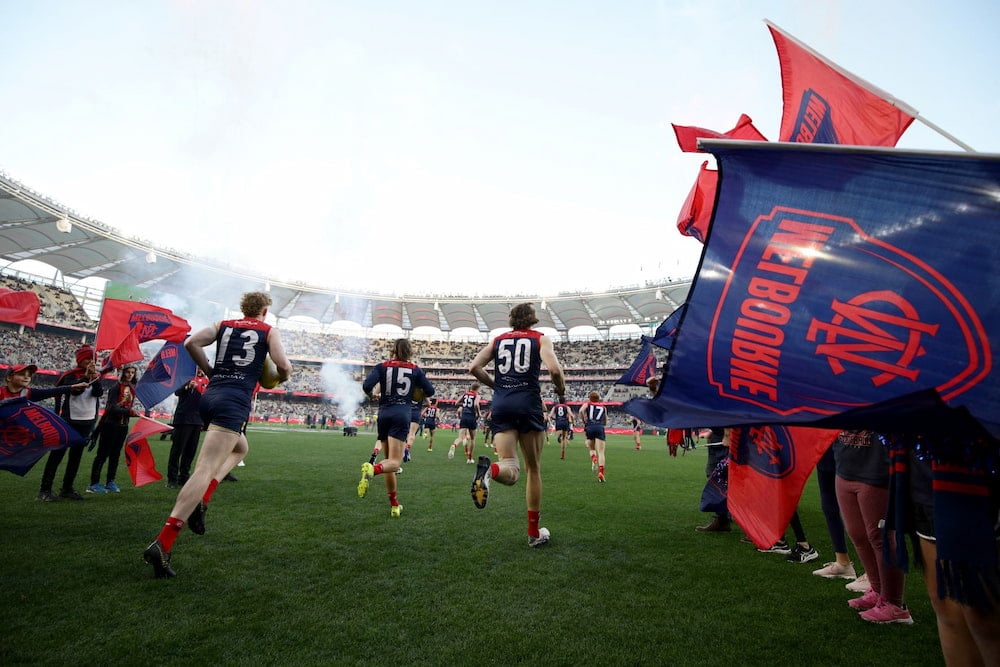In another dimension, next week’s AFL grand final might be a contest between the Melbourne Hawks and Fitzroy Bulldogs.
It is hard to imagine that game taking place, especially in an 18-team competition contemplating further expansion to Tasmania.
It is near impossible to plot out hypothetical paths for one joint venture, let alone two.
But the coming week will provide cause for reflection among anti-amalgamation figures at the Demons and Bulldogs, clubs that could easily have lost their identity as the league schemed to compress its Victorian presence while evolving into a national competition.
Thursday marks the 25-year anniversary of the infamous Melbourne-Hawthorn merger vote night, when hell threatened to break loose.
Both club boards were on board – a new playing strip and monstrous mash-up of their songs had been unveiled – but the movement was derailed in stirring fashion.
Former Hawthorn captain Don Scott provided perhaps the defining image of the night.
On stage, in front of a heaving crowd at Camberwell Civic Centre, he emotively tore the “velcro Hawk” from a Melbourne jumper.
The Hawks ultimately voted against the merger.
The late Ian Ridley, a five-time Demons premiership player and their president in 1996, encountered a groundswell of tears, boos and vitriolic abuse a few suburbs away at Dallas Brooks Hall.
Passionate scenes, far removed from jokes about ski trips and cheese platters, and multiple delays ended with Melbourne’s members officially voting for the merger.
Demon Alternative, the group backed by mining magnate Joseph Gutnick, were unhappy with several aspects of the process and vowed to go to the Supreme Court.
But Melbourne great Robbie Flower brokered a truce between the warring parties, which included the elevation of Gutnick and Demon Alternative co-founder Mark Jenkins to the club board.
“I take objection to people calling out ‘we’re the only club to vote ourselves out of existence’, which is the catch cry for those who want to dig the knives in a bit,” Jenkins told AAP.
“We were very clear there wasn’t a legitimate meeting and we would have comfortably had that overturned.
“But I’m grateful we didn’t have to.
“A lot of good people stepped up at that time. They’re memories that I’m very proud of.
“We contributed in some small way to enabling Melbourne to keep on as its own entity, we were part of the re-galvanising of support for the club.”
The AFL is now a picture of relative stability and professionalism, but merger machinations and speculation were akin to modern-day player trade talk throughout Ross Oakley’s tenure as chief executive from 1986-96.
Oakley cut a swathe through the VFL as it became the AFL, seeking to shore up its financial future by adding West Coast, Brisbane, Adelaide, Fremantle and Port Adelaide to grow its fan base and broadcast revenue.
The league also tried to trim what it viewed as fat, offering incentives for cash-strapped clubs to pack it in.
A push for relocation and mergers ironically reached its crescendo amid centenary-season celebrations in 1996.
Footscray, having tin rattled to the tune of $1.6 million in three weeks to avoid a merger with Fitzroy in 1989, successfully scrapped for survival again but were rebranded as the Western Bulldogs.
The death knell finally sounded for debt-laden VFL foundation club Fitzroy, which was sliced up and shipped off to the Gabba after a miserable one-win season.
It was more a takeover than a merger.
Meanwhile, Ridley and Hawthorn counterpart Brian Coleman held clandestine talks about a proposed marriage.
The Demons, formally divorced from the Melbourne Cricket Club (MCC) in 1980, weren’t cash poor.
But they lacked a centralised base and genuine hope of breaking their premiership drought.
While the Hawks had debt and sponsorship issues, they boasted the Glenferrie Oval headquarters and four of the previous 10 premierships.
Dealings between Melbourne’s board and Demon Alternative were relatively cordial until the chaotic vote night in East Melbourne.
“Like a pack of animals, they howled me down. I was anticipating a fair dinkum riot,” Ridley wrote in his memoir Urge to Merge.
It was almost as willing on the stage, where Brian Dixon – a premiership teammate of Ridley and former state MP – lashed the board for trying to “sell the soul, the integrity and the existence” of his beloved club.
Jenkins noted on Thursday that “both sides of the merger debate” gave as good as they got, on stage and in the audience.
“We all, with the benefit of hindsight, would say it wasn’t a great look. As a football club we could have behaved better,” Jenkins said.
“But there was no physical violence.
“There was a lot of screaming.
“It was passionate people making their intentions known.”
Jenkins is no longer on the board of his beloved club, which struck financial trouble in 2008, but was saved by the late Jim Stynes’ successful presidency and ‘”Debt Demolition” campaign.
He still serves on its past players and officials’ association board.
The group will come together virtually next Thursday, hearing tales from those involved in the 2000 grand final, before taking in Saturday night’s game while locked down.
“I’m not going to get ahead of myself,” Jenkins said.
“But this is something that I think has a different feel (to previous finals series).”
AAP
Get all the latest Canberra news, sport, entertainment, lifestyle, competitions and more delivered straight to your inbox with the Canberra Daily Daily Newsletter. Sign up here.



